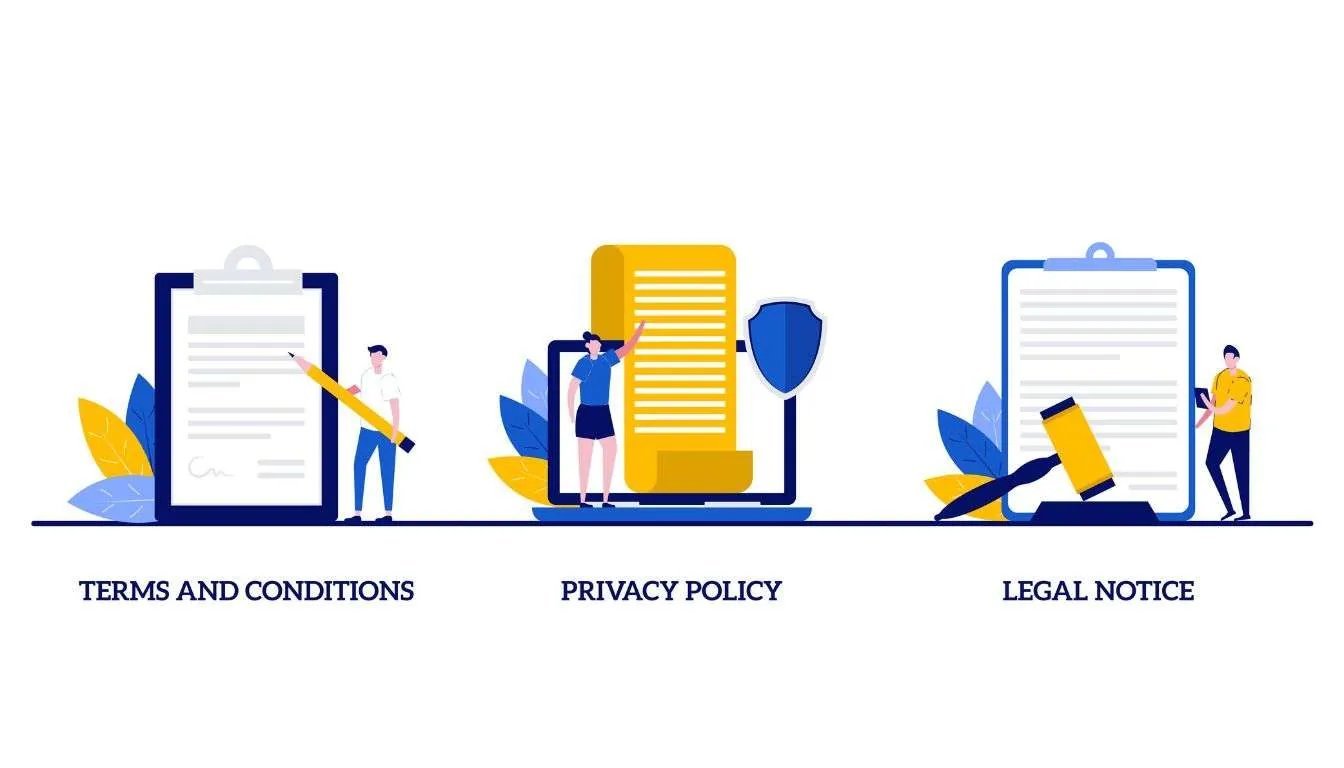Affiliate Disclaimer: Some of the links on this site are 'affiliate links.' This means if you click on the link and purchase the item, we may receive an affiliate commission.
Affiliate marketing has become a popular income stream for individuals and businesses alike. It’s a simple concept: you promote products or services, and when someone makes a purchase through your unique link, you earn a commission. While this business model can be highly rewarding, it comes with serious legal considerations. Affiliate marketing compliance means understanding and adhering to the rules for maintaining credibility, avoiding penalties, and ensuring long-term success.
Key Takeaways
- Disclose Your Relationships: Always let readers know when links might earn you a commission. Transparency keeps trust intact.
- Know the Rules: Stay updated on FTC guidelines (like disclosure placement) and revise your practices regularly.
- Be Honest and Accurate: Promote products you believe in, and never make misleading claims. Integrity matters.
- Understand Vendor Policies: Read and follow the affiliate program’s terms to avoid issues or penalties.
- Protect User Data: Never collect or share user information without permission. Privacy is non-negotiable.
- Monitor Your Content: Review posts and links often to ensure compliance and fix any outdated or broken links.
- Educate Yourself on Taxes: Keep track of earnings and file them properly to avoid legal or financial trouble.
What is Affiliate Marketing?
Affiliate marketing is a performance-based marketing strategy where businesses, known as merchants, partner with individuals or companies to advertise their products. Affiliates are rewarded for driving traffic, leads, or sales through their marketing efforts. It’s a win-win situation when done right, but in failing to meet legal standards, it can quickly turn problematic.
Key Components of Affiliate Marketing
Affiliate marketing is essentially a partnership between four main players:
- Merchants: These are brands or companies that sell the product or service. They create affiliate programs and pay commissions.
- Affiliates: The marketers promoting the products, often through blogs, social media, or email campaigns.
- Affiliate Networks: Platforms that connect merchants with affiliates, handling tracking and payments.
- Customers: The end users who make a purchase or perform a desired action based on the affiliate’s promotion.
Why Affiliate Marketing Legal Compliance Matters
Skirting the law might seem tempting, but it’s a risky game. Clear affiliate marketing compliance builds trust with your audience and protects your financial stability. Non-compliance, on the other hand, can lead to penalties and damage your reputation beyond repair. Real trust comes when people know you’re operating ethically and transparently.
FTC Guidelines and Disclosure Requirements
The Federal Trade Commission (FTC) plays a key role in regulating affiliate marketing. One of its primary focuses? Ensuring that consumers are aware of relationships between affiliates and the merchants they promote.

Mandatory Disclosures for Affiliates
Transparency is non-negotiable. Affiliates must disclose their financial relationships with the brands they promote. For example, saying something like, “As an affiliate, I may earn a commission when you use my link” works well. Disclosures should be:
- Easy to understand: Avoid jargon or complicated wording.
- Clear and visible: Place them near the affiliate link or within the content that contains it.
- Consistent across platforms: Whether on a blog, Instagram post, or YouTube video, the principles remain the same.
If you’re unsure about how to write compliant disclosures, check out this guide to affiliate compliance under the Understanding FTC Affiliate Disclosure Rules.
Consequences of Non-Compliance
Failing to meet regulations can result in hefty fines, negative publicity, and a loss of audience trust. The FTC has pursued cases against affiliates and merchants alike for misleading or unclear practices. It’s a situation no affiliate wants to face.
Privacy and Data Protection in Affiliate Marketing
Whether you realize it or not, affiliate marketing involves a lot of data collection, from tracking clicks to monitoring user behavior. But with data protection laws like GDPR and CPRA in play, it’s essential to handle said data responsibly.
Understanding Key Data Privacy Regulations
- GDPR (General Data Protection Regulation): Focuses on protecting consumer data in the European Union. It requires clear consent before collecting data and enables users to opt-out of its use.
- CPRA (California Privacy Rights Act): Offers similar protections in California, allowing users to access, delete, or restrict the use of their information.
For more information, check out this guide on affiliate marketing compliance.
Steps to Ensure Compliance with Data Protection Laws
- Obtain consent: Make sure users know why their data is being collected.
- Provide transparency: Explain what the data’s being used for and how long it’s retained.
- Keep data secure: Use encryption and other protective measures.
Common Legal Pitfalls in Affiliate Marketing
The affiliate world isn’t without its challenges. Many find themselves in trouble simply because they don’t know the rules—or ignore them.
- Trademark Bidding and Copyright Violations
Using a company’s trademarks in advertisements without permission? That’s trademark bidding, and it’s illegal. Similarly, using copyrighted materials without approval can land you in hot water. Always check licensing and permissions beforehand.
- Fraudulent Practices
Some affiliates resort to tactics like cookie stuffing (forcing affiliate links onto unsuspecting users) or malware to generate commissions. These practices are outright fraud and could lead to criminal charges. Avoid them at all costs.
- Non-Compliant Advertising Claims
Overstating a product’s benefits or promising results it can’t deliver? It’s tempting, but dishonest claims could result in a lawsuit and do irreparable damage to your reputation.
For more guidance, consider reading Legal Pitfalls of Affiliate Marketing.
Best Practices for Legal Compliance in Affiliate Marketing for Merchants
Committing to legal compliance is about building a trustworthy, credible affiliate business.
- Clear Policies and Agreements
Establish detailed affiliate terms and conditions outlining expectations and legal obligations. This creates a foundation for a healthy partnership.
- Monitoring and Education
Educate yourself and your affiliates regularly. The legal landscape is constantly evolving. Consider tools and workshops to stay updated. Monitoring affiliate activities is equally important—unauthorized actions by your affiliates can also reflect poorly on you.
Legal Compliance in Affiliate Marketing: Frequently Asked Questions
What is affiliate marketing compliance, and why does it matter?
Affiliate marketing compliance means following laws and guidelines that regulate advertising, consumer protection, and privacy. It’s important to avoid legal trouble and build trust with your audience. Non-compliance can lead to fines, account bans, or even legal action.
Do I have to disclose my affiliate relationship?
Yes, it’s required by the Federal Trade Commission (FTC) in the U.S. You need to transparently tell your audience about your affiliate relationships. Clear disclosures, like saying, “As an affiliate, I earn a commission,” are not optional—they’re the law.
How do global privacy laws like GDPR and CCPA affect affiliate marketing?
Privacy laws like the EU’s GDPR and California’s CCPA require you to handle personal data responsibly. This means getting consent before collecting data, explaining how it’s used, and ensuring user rights like data deletion. Violating these laws can lead to serious fines. For more details, check out Entrust.com.
Can I use someone else’s content in my marketing?
Not without permission. Copyright laws protect all original content, so using text, images, or videos without approval can land you in legal trouble. It’s best to create your own content or obtain proper licensing. See Copyright.gov for more information.
What are common violations in affiliate marketing?
The most frequent missteps include cookie stuffing, fake clicks, fraudulent promotions, trademark bidding, and hiding affiliate links. Each of these violates laws or platform policies and can lead to penalties.
What should an affiliate marketing disclosure look like?
Disclosures should be easy to find and understand—no fine print or legalese. Simple phrases like “This page contains affiliate links. I may earn a small commission at no extra cost to you” work well.
Do I need a written agreement with affiliates?
Yes, having a formal affiliate agreement is crucial. It should outline responsibilities, payment terms, advertising rules, and how disputes will be handled. A clear contract protects both you and your affiliates.
How can I monitor compliance in my affiliate program?
Use analytics tools, affiliate compliance software, fraud detection software, and regular reporting to check for red flags like odd click patterns or misleading promotions. Continuous monitoring is key to staying on track.
Are misleading ads a problem for affiliates?
Absolutely. False claims about products or services are illegal and can damage a brand’s reputation. Always stick to honest, fact-based marketing, as misleading content violates consumer protection laws.
What happens if I don’t comply with the rules?
Non-compliance can lead to warnings, the loss of commissions, account suspension, or even legal action. In some cases, fines could reach millions, so it’s worth taking affiliate marketing compliance seriously.
How do I stay updated on compliance requirements?
Laws and regulations can change often. Follow trusted marketing blogs, subscribe to FTC updates, or consult with a legal advisor specializing in online advertising. Staying informed helps you stay compliant.
Is data collection allowed in affiliate marketing?
Data collection is fine, but only with user consent and within the limits of privacy laws like GDPR. Always be transparent about what you’re collecting and why, and make it easy for users to opt out.
Can I use AI tools for content or advertising in affiliate marketing?
Yes, but be careful. Ensure AI-generated content meets copyright and advertising rules. Disclose if your content is AI-created and avoid using it to make false claims. Legal risks can arise if AI content isn’t handled well.
Being transparent and proactive about affiliate marketing compliance doesn’t just protect you legally—it also keeps your audience’s trust intact.
Final Thoughts
Affiliate marketing compliance might sound intimidating, but it’s a necessary part of running a responsible, profitable business. By keeping disclosures clear, respecting data protection laws, and avoiding shady practices, you’ll not only stay on the safe side of the law but also build invaluable trust with your audience. Take the time to learn the rules, and your affiliate marketing efforts will be on solid ground. If you’re just starting out, make sure to check comprehensive resources like Affiliate Marketing Compliance for more actionable insights.

